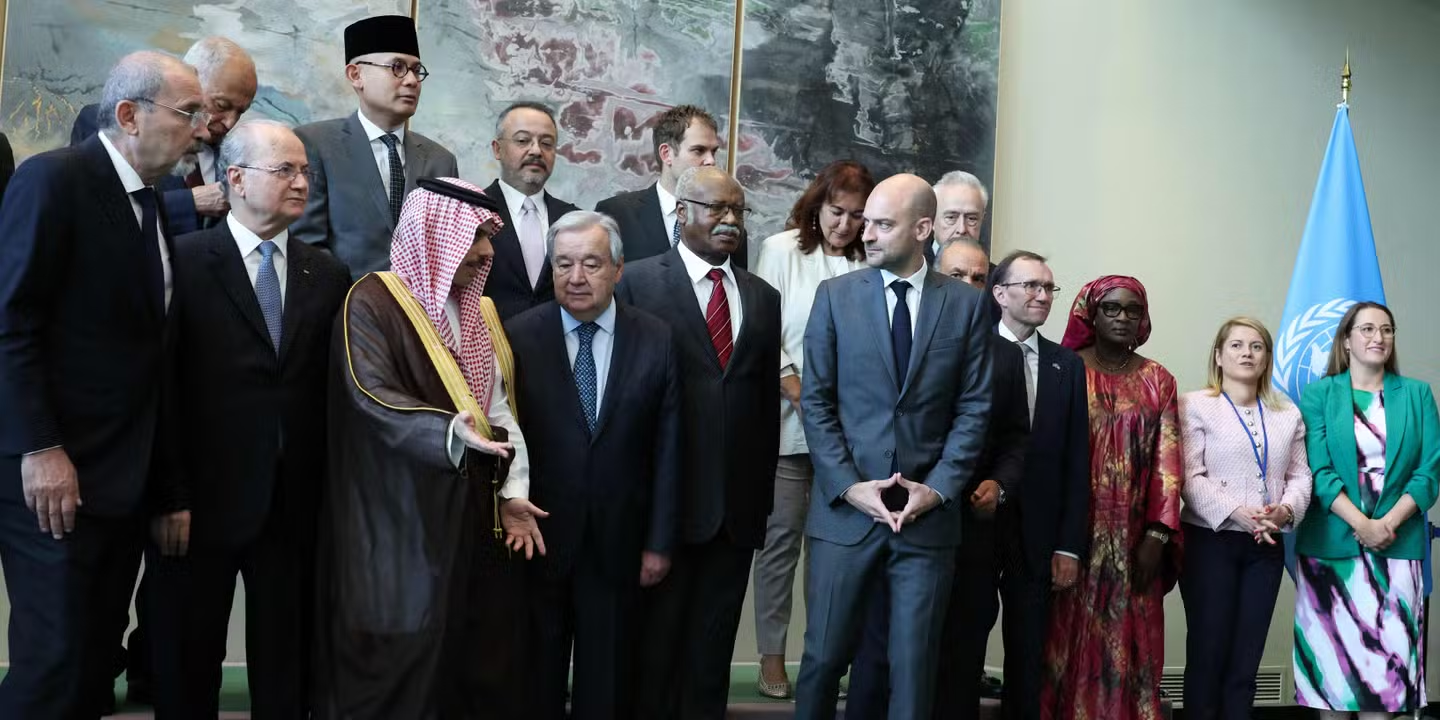Saudi-French-led UN conference for global recognition of Palestinian statehood amid Western resistance

Department of Research, Studies and International News 29-07-2025
A high-level diplomatic initiative led by Saudi Arabia and France has kicked off at the United Nations, aiming to gather international support for the recognition of Palestinian statehood. The three-day summit, which began Monday in New York, seeks to lay a serious foundation for a comprehensive political settlement to the ongoing Israeli aggression in Gaza.
This major international gathering comes at a crucial time, as the humanitarian crisis in Gaza continues to escalate, with Israeli forces committing what human rights organizations are now calling acts of genocide. In stark contrast to the United States and Israel’s dismissive stance, the Saudi-French alliance presents a growing global front determined to restore justice and sovereignty to the Palestinian people.
French President Emmanuel Macron has announced that France will formally recognize the State of Palestine by September, a move he says is intended to revive long-stalled peace efforts toward a two-state solution. Macron’s position is shared by French Foreign Minister Jean-Noël Barrot, who emphasized during the conference’s opening session that “only a political, two-state solution will help respond to the legitimate aspirations of Palestinians and Israelis to live in peace and security.” He stressed, “There is no alternative.”
In parallel, Saudi Arabia has taken an active role in both political and humanitarian efforts. Saudi Foreign Minister Prince Faisal bin Farhan Al Saud confirmed that the Kingdom is seeking World Bank approval to transfer $300 million in aid to Gaza and the occupied West Bank. More importantly, he reiterated the unwavering Saudi position in support of the Palestinians’ right to establish an independent state along the 1967 borders, with East Jerusalem as its capital.
“This is not merely a political stance,” Prince Faisal stated, “but a firm conviction that an independent Palestinian state is the true key to peace in the region.”
The conference is co-chaired by 16 additional international actors, including Ireland, the United Kingdom, and the European Union. Despite the UK’s current lack of formal recognition of Palestine, mounting pressure from within the British Parliament signals a potential shift. Over 220 MPs, a third of the legislative body, have signed a letter calling on Prime Minister Keir Starmer to take definitive action toward state recognition and contribute to a viable two-state solution.
According to sources within the Labour government, the question of recognition is now seen as a matter of “when, not if.” Starmer has reportedly convened an emergency cabinet meeting this week to address the worsening situation in Gaza. He is also expected to raise the issue of humanitarian access and aid delivery with U.S. President Donald Trump, highlighting the alarming levels of starvation and malnutrition across the Gaza Strip.
Trump, who continues to back Israel unconditionally, met with Starmer at his Turnberry golf resort in Scotland to discuss trade and regional instability. While Trump has refrained from publicly endorsing Israel’s claims that no starvation exists in Gaza, his administration has dismissed the Saudi-French-led conference as “unproductive and ill-timed.”
A spokesperson from the U.S. State Department described the summit as a “stage-managed” event and reaffirmed Washington’s unwillingness to participate. “Our focus remains on serious diplomacy,” they claimed, “not on conferences designed to manufacture the appearance of relevance.”
Israel, for its part, has reacted with predictable hostility. Prime Minister Benjamin Netanyahu condemned France’s move to recognize Palestinian statehood, labeling it as a “reward for terrorism” and warning that a Palestinian state would serve as a “launchpad to annihilate Israel.” Israeli UN Ambassador Danny Damon echoed this rhetoric, accusing the conference of being disconnected from reality and dismissing its relevance.
However, criticism from Western powers has failed to suppress the momentum. Two of Israel’s own human rights watchdogs, B’Tselem and Physicians for Human Rights, have accused Tel Aviv of orchestrating a genocidal campaign in Gaza. They have also called on Western allies to fulfill their legal and moral responsibilities to stop the bloodshed.
With more countries now reconsidering their positions on Palestinian statehood, and with a growing chorus of international voices demanding accountability, the Saudi-French initiative represents a significant shift in the global diplomatic landscape. While Washington and Tel Aviv attempt to delegitimize the effort, the tide of history appears to be turning in favor of justice and sovereignty for the Palestinian people.





